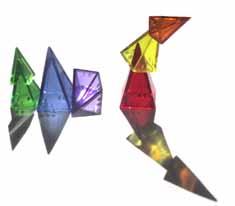Quick Links
Advertisements
No ends building toy
Great geeky toys
Categories
Archives
XML/RSS Feed
Statistics
Total entries in this blog:
Total entries in this category:
Published On: Nov 13, 2009 08:19 AM
Total entries in this category:
Published On: Nov 13, 2009 08:19 AM
Related websites
Geometric Toy
Supermagnetic Polyhedra
Architectural Toys
Zomeworld (list)
Polytopia (list)
Math Toys Community at Orkut (requires invitation to join orkut - e-mail me to request one)
Supermagnetic Polyhedra
Architectural Toys
Zomeworld (list)
Polytopia (list)
Math Toys Community at Orkut (requires invitation to join orkut - e-mail me to request one)
Zendo: a game of logic

Zendo
is one of over a hundred different games that can be played with Icehouse pyramids. In
Zendo, one player, the Master, secretly decides on a rule that a small
assemblage of pyramids must follow - for example, that all upright pieces in it
must be red. The Master builds two examples: one which follows the rule, and one
which does not. The remaining players then take turns building their own
assemblages to test what the rule might be, and giving their best deductions.
When a player has guessed a rule, if the guess is not correct, the Master must
build either an assemblage which does meet the secret rule but not the proposed
rule, or one that does not meet the secret rule but does meet the one
proposed.
Sounds easy, doesn't it? I'm afraid that we in my little group of friends are not yet very good at it. We can be stumped for a surprisingly long time by a rule which rates only three or four points on Jake Davenport's scale of example rules (he has rated them from one to nine, according to difficulty). It's not that we're stupid - half of the players had perfect scores on the logic section of the GRE - we just need more practice in being logical. Zendo's not just maddeningly entertaining, it's also good training in logic. It is aimed at adults, not children. My seven-year-old has been happily learning logic with it, but he is a fiend for anything at all mathematical.
Icehouse pyramids come in a variety of colors; the Zendo game set includes four colors (red, green, blue, yellow), plus markers used to keep track of which constructions meet the rule and which do not. You can buy additional 'stashes' of fifteen pyramids of a color. Of the three sizes of pyramids, the largest has three 'pips' embossed near one edge; the medium size has two; and the smallest has one pip. A pyramid which is touching the table is called 'grounded', while one that is not is called 'ungrounded'. A piece that is pointing straight up is called 'upright', one that is flat on the table surface, or parallel to it if ungrounded, is called 'flat', and one that is neither is called 'weird'. In the photo to the upper left, the top orange piece and the middle yellow piece are both weird.
If your local game store doesn't carry Icehouse pyramids, you can order them from Looney Labs, or, for a significantly lower price, from Fair Play Games. We have found both companies to be quite satisfactory to deal with. The pyramids are a bit expensive, but versatile, since you can play many different games with them. You can also construct your own origami icehouse pieces for free, or spend a vast sum on stone pyramids.
Sounds easy, doesn't it? I'm afraid that we in my little group of friends are not yet very good at it. We can be stumped for a surprisingly long time by a rule which rates only three or four points on Jake Davenport's scale of example rules (he has rated them from one to nine, according to difficulty). It's not that we're stupid - half of the players had perfect scores on the logic section of the GRE - we just need more practice in being logical. Zendo's not just maddeningly entertaining, it's also good training in logic. It is aimed at adults, not children. My seven-year-old has been happily learning logic with it, but he is a fiend for anything at all mathematical.
Icehouse pyramids come in a variety of colors; the Zendo game set includes four colors (red, green, blue, yellow), plus markers used to keep track of which constructions meet the rule and which do not. You can buy additional 'stashes' of fifteen pyramids of a color. Of the three sizes of pyramids, the largest has three 'pips' embossed near one edge; the medium size has two; and the smallest has one pip. A pyramid which is touching the table is called 'grounded', while one that is not is called 'ungrounded'. A piece that is pointing straight up is called 'upright', one that is flat on the table surface, or parallel to it if ungrounded, is called 'flat', and one that is neither is called 'weird'. In the photo to the upper left, the top orange piece and the middle yellow piece are both weird.
If your local game store doesn't carry Icehouse pyramids, you can order them from Looney Labs, or, for a significantly lower price, from Fair Play Games. We have found both companies to be quite satisfactory to deal with. The pyramids are a bit expensive, but versatile, since you can play many different games with them. You can also construct your own origami icehouse pieces for free, or spend a vast sum on stone pyramids.
Posted: Sun - June 20, 2004 at 10:20 AM